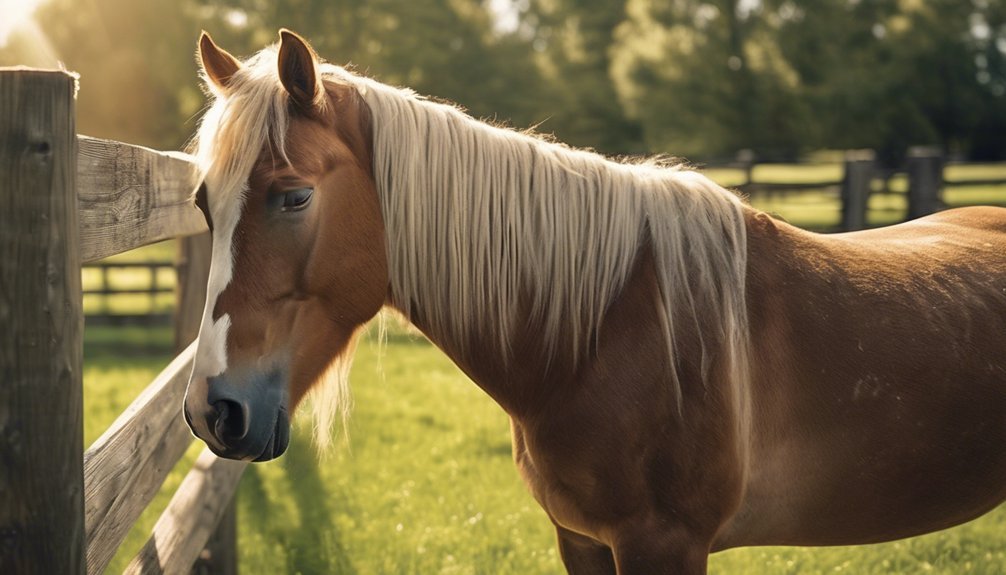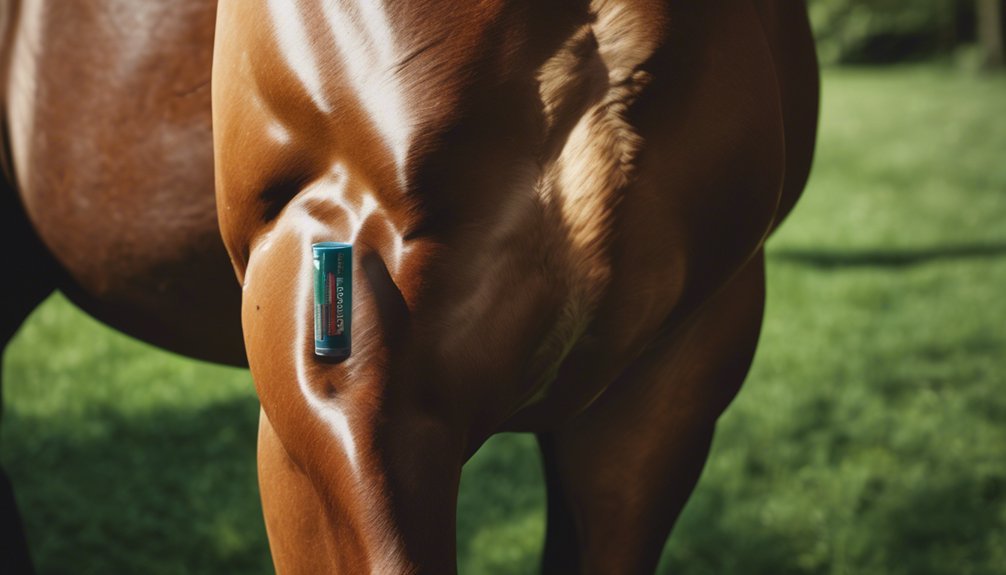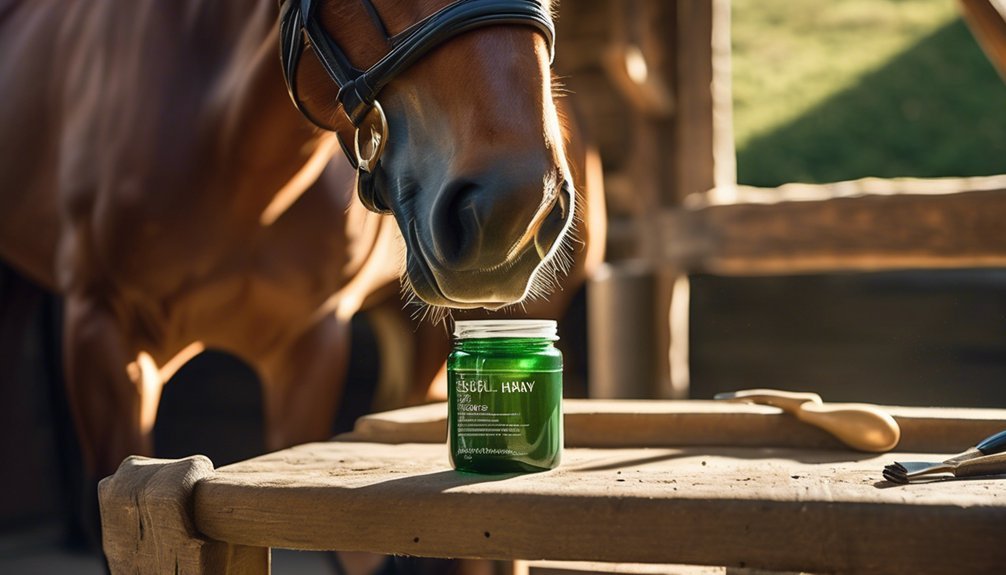
Horse mites can pose significant challenges to your horse's health and comfort, making it essential to know how to prevent and treat these pests effectively. By maintaining a clean environment and practicing routine grooming, you can minimize the risk of infestation. However, recognizing the early signs of trouble is crucial. If you've noticed any unusual behaviors in your horse, it's time to explore the best treatment options available.
Key Takeaways
- Maintain a clean environment by regularly sanitizing stalls and removing bedding to reduce mite habitats.
- Implement daily grooming routines, focusing on sensitive areas to remove dirt and dead skin.
- Observe for signs of infestation such as itching and hair loss, and act promptly if noticed.
- Use natural remedies like diatomaceous earth, along with medicated shampoos, for mite treatment.
- Consult a veterinarian for severe cases, considering prescribed treatments and insecticides for effective eradication.
Understanding Horse Mites and Their Impact

When you're caring for horses, understanding horse mites and their impact is crucial, as these tiny parasites can cause significant discomfort and health issues.
Mite biology reveals that these organisms thrive in warm, moist environments, often infesting your horse's skin and coat. Their life cycle includes stages that depend on host interaction, meaning they need your horse for nourishment and reproduction.
You might notice signs like itching, hair loss, or skin irritation, which can lead to secondary infections if left untreated. By recognizing these symptoms early, you can better support your horse's well-being.
Effective Prevention Strategies
Recognizing the signs of horse mites is the first step in addressing infestations, but you can take proactive measures to prevent these pests from affecting your horse in the first place.
Focus on environmental control by regularly cleaning and sanitizing your horse's living area. Remove bedding and debris that can harbor mites, and ensure proper ventilation to reduce humidity.
Implement consistent grooming practices, brushing your horse daily to remove dirt and dead skin that can attract mites. Pay special attention to sensitive areas like the mane and tail.
Additionally, consider using mite-resistant bedding and regularly inspect your horse's coat for any irregularities.
Recognizing Signs of Infestation

How can you tell if your horse is suffering from a mite infestation? Start by observing any infestation symptoms like excessive itching, hair loss, or skin irritation.
You might notice your horse rubbing against objects or even rolling more frequently. Pay close attention to areas like the mane, tail, and face, as these are common sites for mite activity.
Mite identification can be tricky, but if you see tiny, moving specks or crusty patches on the skin, it's a red flag.
Additionally, changes in behavior, such as increased anxiety or restlessness, can signal discomfort due to mites. Being vigilant about these signs can help you address the issue early, ensuring your horse stays comfortable and healthy.
Treatment Options for Horse Mite Infestations
To effectively treat horse mite infestations, it's crucial to act quickly and use a combination of methods tailored to your horse's specific needs.
Start with natural remedies like diatomaceous earth or essential oils, which can help reduce mite populations while being gentle on your horse's skin. You may also consider regular bathing with medicated shampoos designed to eliminate mites.
However, don't hesitate to consult your veterinarian for more severe infestations. They can prescribe veterinary treatments, such as topical insecticides or oral medications, ensuring a comprehensive approach to eradication.
Maintaining Overall Equine Health

While addressing mite infestations is essential, maintaining your horse's overall health plays a crucial role in preventing future issues. A well-cared-for horse is more resilient to pests and diseases.
Focus on the following aspects to ensure your horse thrives:
- Balanced equine nutrition: Provide a diet rich in vitamins, minerals, and fiber to boost immunity.
- Regular exercise: Encourage daily movement to promote circulation and overall fitness.
- Routine veterinary care: Schedule regular check-ups and vaccinations for early detection of health concerns.
- Clean living environment: Keep your horse's stall and pasture clean to reduce exposure to pests.
Frequently Asked Questions
Can Horse Mites Affect Other Animals or Humans?
Yes, horse mites can affect other animals and humans, though transmission is less common. Affected species may include dogs and cats, so it's crucial to monitor your pets for signs of irritation or discomfort.
How Long Do Horse Mites Live Without a Host?
Imagine a fragile thread, reliant on its anchor. Horse mites, in their lifecycle, typically survive only a few days without a host. Their dependency highlights the intricate bond between creatures, emphasizing the need for vigilant care.
Are There Natural Remedies for Horse Mite Infestations?
Yes, there are natural treatments for horse mite infestations. You can use essential oils like tea tree or lavender, which have soothing properties and help deter mites. Always dilute them before application to ensure your horse's safety.
How Often Should I Check My Horse for Mites?
You should inspect your horse for mites at least once a week. Look closely for signs of infestation, like itching or hair loss. Early detection can prevent a larger issue and keep your horse comfortable.
Can Horse Mites Cause Long-Term Health Issues?
Yes, horse mites can lead to long-term effects if left untreated. You might notice persistent mite symptoms like itching or skin lesions, which can affect your horse's overall well-being and quality of life. Regular checks are essential.
Conclusion
In conclusion, keeping your horse mite-free requires diligence and care. By maintaining a clean environment and recognizing early signs of infestation, you can protect your horse from discomfort and health issues. Just imagine your horse, bright-eyed and free from irritation, trotting happily in the pasture. With the right prevention and treatment strategies, this vision can be a reality. Don't hesitate to reach out to a veterinarian if you need tailored advice for your equine companion's well-being.





